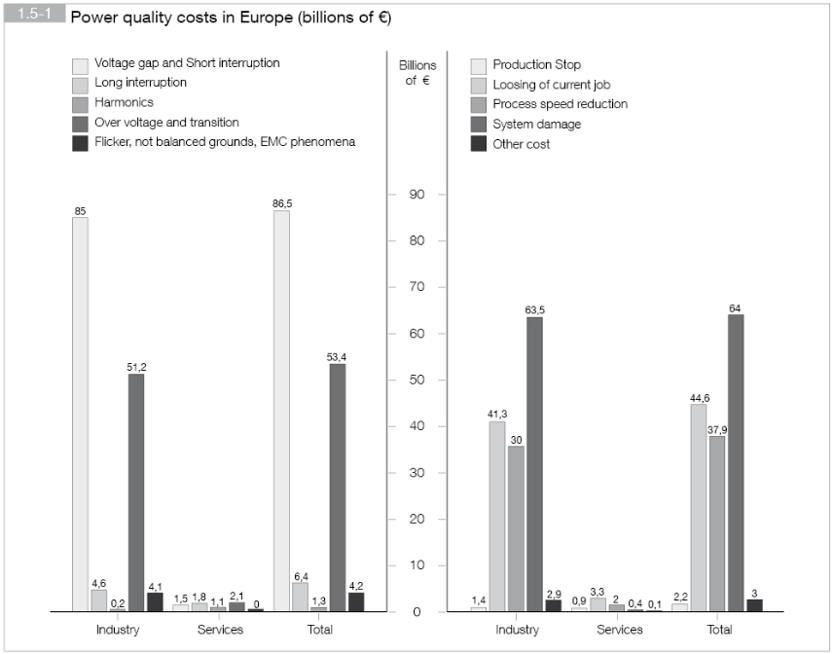Effective or efficient UPS?
Uninterruptible power supply (UPS) systems are essential for guaranteeing the business continuity of any industrial or commercial enterprise.
Recent technological developments and the emergence of green culture have fuelled the debate regarding the two main factors which determine the selection of a UPS: energy saving (efficiency) and availability (effectiveness).
A UPS with an efficiency rating close to 100% means that the energy loss from the UPS is minimal and that almost all power reaches the load[1].
Availability indicates the extent to which the UPS guarantees the electrical protection of the load, preventing the risk of downtime[2].
Particularly in the case of mission critical loads, the selection of a high-efficiency UPS solution must obviously also take into account the type of technology, to ensure that the supply of high-quality power to the load is uninterrupted.
UPS and power quality
Electrical power is far from being an invariable energy resource, insofar as it is subject to the influence of users.

[1] Consider that for a medium-power UPS (200 kVA) operating at full load, every additional percentage point of efficiency equates to an annual energy saving of approximately € 2,000.
[2] Consider that 30 minutes of downtime in a medium-sized process industry may cause economic losses amounting to tens of thousands of €.
[3] Leonardo Energy: European Power Quality Survey Report (November 2008)
Even in countries with the best quality mains networks, high-quality electricity supplies are often compromised within the system itself by users which cause flicker, voltage dips, surges, transients and harmonics.
A recent study[3] helps to evaluate the costs of low power quality. It highlights that more than 151 billion € are wasted in Europe every year, not only due to voltage dips and long interruption (61.2 %) but also due to overvoltage or transients in general (35.2 %), harmonics (<1 %) and flicker, and EMC problems (<1 %).
The only UPS technology which ensures full availability of high-quality electricity is on-line double conversion. This is the only technology which can protect loads not just from blackouts, but also from any electrical impurities (flicker, voltage dips, surges, transients and harmonics) caused by the mains supply or by distorting loads.
The ideal UPS: maximum energy saving without compromising on availability
The key to selecting a UPS system is achieving the right balance between energy saving and availability.
Lately much emphasis has been given to the “green” factor. Some UPS manufacturers quote extremely high efficiency ratings for their products (sometimes claiming values in excess of 99%), even though these ratings only apply to off-line modes of operation, e.g. with the UPS not continually powering the load, but intervening only when the mains supply fluctuates outside pre-set voltage and frequency tolerances. Moreover, recent on-line UPS technologies have introduced hybrid operating modes, based on intelligent systems which automatically switch the UPS from off-line to on-line mode. In each case, while energy saving is certainly increased, the security of total electrical protection is compromised.
All this begs a number of questions: is such a compromise worth accepting? Does it make sense to choose a UPS that offers the best protection (on-line), only to then use it in off-line modes (no matter how sophisticated and “green” they may be), thus increasing the risk of downtime? Does it make sense to expose a mission-critical load to impurities and power events when you’ve invested in the best protection against power quality disturbance?
No! Because the green factor isn’t the only factor to take into consideration.
Let us not forget that the primary aim of the UPS is to provide maximum protection of mission-critical loads and therefore to ensure the uninterrupted availability of high-quality power: this can only be guaranteed by exploiting the full capability of on-line technology.
Lack of availability can result in economic losses, personal injury and damage to property or services. Compromises such as green hybrid protection solutions, which expose the system to power disturbances, should be avoided.
The green concept should therefore be expanded to a broader horizon, where maximum energy saving goes hand in hand with maximum power availability. The latest UPS systems from SOCOMEC have a certified efficiency rating of up to 96% (among the highest on the market) and always operate in on-line mode, ensuring maximum load protection. For SOCOMEC UPS this is the concept of Absolute Green: maximum energy saving without compromising on availability.
Tech Info – June 2010
PROTECTING BUSINESS CONTINUITY
by
MATTEO GRANZIERO
Technical Communication Specialist
SOCOMEC UPS

